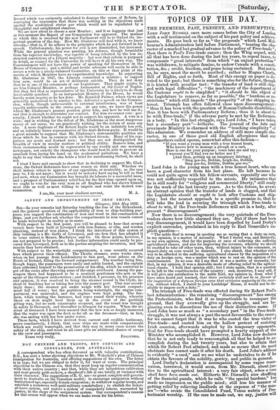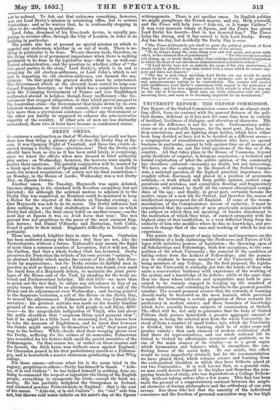TOPICS OF THE DAY.
THE PREMIERS, PAST, PRESENT, AND PRESUMPTPTE. Loan JOBIf RUSSELL once more comes before the City of London with a self-testimonial on the subject of his past policy and achieve- ments. He goes back so far as the proposals which Lord Mel- bourne's Administration laid before Parliament, "bearing the cha- racter of a marked but gradual advance to the policy of Free-trade "; then there is Peers Free-trade career; • then the Whig sequel, with all that has been done during the last ten years, to repeal taxes, te compensate "great interests" from which an unjust protection" was withdrawn, to mitigate famine, to endow Canada with a consti_ tution, &o. ; credit, freedom, and peace being sustained. But not to us, he says, must the merit be ascribed ; rather to Magna Chart; Bill of Rights, and so forth. Most of this energy on paper is de- voted to the past ; but there is something also for the future, though it is hinted with peculiar tact: "the transfer of land is still clog- ged with legal difficulties"; "the machinery of the department of the Customs ought to be simplified " ; "it should be the object of the Legislature to remove, as far as possible," the "burdens or re- strictions" which still impede "the prosperity" of the shipping in- terest Triumph has often followed close upon discouragement: "thus it has been with the question of Roman Catholic disabilities; thus it has been with Parliamentary Reform ; thus it is about to be with Free-trade," if the adverse party be met by the Reformers in a body. "In this last struggle, says Lord John, "I have taken but a secondary part "—hitherto. The journal of the late and proximate Ministry is charmed with the "touching simplicity" of this admission. We remember an address of still more simple cha- racter, in one of those good old English afterpieces that our grandmothers called operas, somewhat after this fashion—
"If you want a young man with a true honest heart, Who knows how to manage a plough or a cart, Here is one for your purpose; come take me and try ; I warrant you'll find you no better nor I." [And then, getting up an imaginary driving,) "Sing gee-ho, Dobbin, heigh-ho, Dobbin,
Sing gee-ho, Dobbin' Dobbin gee-wo." Lord John is the young man witha true honest heart, who can have a good character from his last place. He left because he could not quite agree with his fellow-servants, especially one who was not sufficiently respectful to the missis. He intimates that he is still ready for "religious and commercial liberty," still ready for the work of the last twenty years. As to the future, he avows an abstract opinion that the transfer of lands is clogged, and that the Legislature should or ought to look after Customs and ship- ping ; but the nearest approach to a specific promise is, that he will take the lead in securing the triumph which Free-trade is about to win, if the Free-trade Reformers will act in a body, after present "discouragement."
Now there is no discouragement ; the very quietude of the Free- traders shows how little alarmed they are. But if there had been any discouragement, it would have been dispelled by Lord Derby's explicit surrender, proclaimed in his reply to Earl Granville's ex- plicit question-
" The noble Earl is wrong in quoting me as saying that a duty on corn, in my opinion i, a matter of necessity. What I stated was, and distinctly, as my own opinion, that for the purpose at once of relieving the suffering agricultural classes, and also for improving the revenue, whereby we should be enabled to take off other taxes, then, without injury to the consumer, an import-duty on corn would be desirable. I also stated, that whether relief was to be afforded to the suffering agricultural classes by the imposition of a duty on foreign corn, was a matter which was to rest on the opinion of the constituencies. In no ease did I say that it was a matter of necessity, but that, in my opinion, it was a desirable mode of offering relief to the agricul- tural classes. I hold that opinion still ; but I state again, that is a question to be left to the constituencies of the country : and, moreover, I may add, if it will give any satisfaction to the noble Earl, my opinion is, from what I have since heard and learned, that there certainly will not Be in favour of the invosition of a duty on foreign corn that extensive majority in the coun- try, without which, I stated to your Lordships' House, it would not be de- sirable to impose such a duty." The triumph of Free-trade was effected during Sir Robert Peel's last Administration : the remaining " discouragement " lies among the Protectionists, who find it so impracticable to reconquer the ground, that they avowedly give up the struggle, and are be- ginning even to discontinue the use of their distinctive name. If Lord Sohn bore so much as "a secondary part " in the Free-trade struggle, it was not always a part the most favourable to the cause ; for we cannot forget that it was he who ousted the true victor of Free-trade—and ousted him on the hollow pretext of resisting Irish coercion, afterwards adopted by its temporary opponents. Zeal for Free-trade should have prompted a hearty support of the Minister who accomplished it. However, Lord John now declares that he is not only ready to reaccomplish all that he helped to ac- complish during the last twenty years, but also to attain that which Sir Robert Peel attained, and made so secure that its most obstinate foes cannot undo it after his death. Lord John's address is evidently " a card," and we see what he undertakes to do if he obtain the favours of the nobility, gentry, and public in general. Lord Derby's declaration is accompanied by some vague reser- vation, borrowed, it would seem, from Mr. Disraeli, about jus- tice to the agricultural interest : a very fair object, when a case shall have been made out. Hitherto Mr. Disraeh's nice shuffling of the financial puzzle, which he calls "the special burdens," has made no impression on the public mind ; still less his manner of getting relief by relieving landlords at the expense of "the mas- ses "—who create the Consolidated Fund, Venus nutrix of Pro. tectionist worship. If the ease be made out, we say, justice Wail not be refused. To fish out that unknown something, however, was not Lord Derby's mission in reentering office but to restore protection; and as he waives that, he is confessedly stopping in office to do—nothing in particular.
Lord John, disarmed of his Free-trade device, is equally pro- posing to reenter office, through the City of London, in order to do nothing in particular.
The public also has at present no special mission on which to appoint any statesman, whether in or out of work. There is no- thing in particular to be done. We are thrown back, therefore, on the thing which is of permanent importance when there is nothing particular to be done in the legislative way—that is, on well-con- ducted administration; and the question is, whether either of "the two great parties in the state," Lord Derby's which is in and is unsaying its old election-addresses, or Lord John's which is out and is repeating its old election-addresses, can furnish the ma- chinery. On that point the gravest doubts must be entertained. The Government which at the eleventh hour ousted its long-con- tinued Foreign Secretary, or that which has a suspicious intimacy with the Usurping Government of France and sees Englishmen maltreated abroad in helpless though fussy inefficiency—the Go- vernment that stopped emigration, or that which proves unequal to the Australian crisis—the Government that broke down by its own inherent weakness, or that which cannot, with every trick, main- tain more than a provisional existence—either one Government or the other can hardly be supposed to exhaust the administrative capacity of the country. If other sets of men are less distinctly understood, those two at least have become as condemned stores.



























 Previous page
Previous page